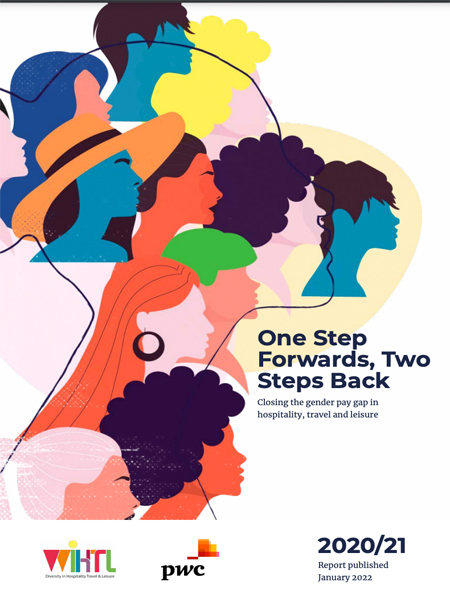Another report from WiHTL and PwC has highlighted the lack of progress towards closing the gender pay gap in hospitality, travel and leisure (HTL).
This year’s research attributes the lack of progress largely due to the turbulence and ‘Covid actions’ brought about by the pandemic. The report, which explores advancements made to close the gender pay gap in HTL, revealed limited progress this year. In fact, progress has regressed, particularly within the hospitality sector; where the average mean pay gap actually increased for the first time in three years (from 5.4% to 7.7%). The overall mean pay gap in HTL increased from 7.4% to 9%.
Whilst the cancelled 2019/2020 reporting deadline and six-month delay to the 2020/21 deadline was welcomed by many employers addressing the ongoing impact of the pandemic; many experts believe that this may have stalled progress for some companies, especially those who still have not calculated and/or disclosed their 2019/20 gap.
MANDATORY GENDER PAY GAP REPORTING
In the UK’s forth year of mandatory gender pay gap reporting, the HTL sector saw around 60% of firms (475) disclose their gender pay gap as of 5th October 2021; compared to nearly 80% that had reported in 2018/19 (the last ‘normal’ reporting year before the pandemic). This is below average compared to other sectors where disclosure is at 80%.
The report found that the average HTL company had 58% males in the highest paid 25% of their workforce; but 54% females in the lowest paid 25%. Besides contributing to pay inequalities, this distribution means that female jobs are more likely to be casual and vulnerable to reactionary business decisions; than male roles. The mean and median pay gaps reported continue to reflect that there are far more men than women in the best paid senior positions and technical roles in HTL; and far more women in lower paid jobs.

PROMISING RETURN OF PROGRESS
The report did, however, highlight promising signs that progress might return. PwC expects D&I and fairness to be focus areas for employers, investors, customers and staff; due to a heightened focus on corporate purpose and long-term strategy as the sector begins to recover from the pandemic. Transparency and reporting on gender and other diversity characteristics, is one of the clearest signals that businesses can make to show that they are committed to driving change; and holding themselves to account in this important area.
The report found a wealth of action being taken by businesses who did disclose; including focusing on people development, inclusive recruitment, updating policies and processes and improving education and awareness. “Whilst it is widely acknowledged that the impact of the pandemic upon the economy disproportionately affected both women and the HTL sector, it’s encouraging to see companies across the sector stepping up to be seen as transparent with their reporting; and taking meaningful action,” commented Tea Colaianni, Founder & Chair of WiHTL. “There is a noticeable commitment to attract, retain and invest in diverse talent pipelines; and nurture a culture where everybody feels they have the same opportunities to progress and celebrate differences. We have seen significant investment in developing a common language for inclusive leadership; and a remarkable effort to support the promotion of talented female leaders at all levels.”
However, there is “still much to do to ensure parity of gender representation and opportunities in the workplace”, continued Colaianni. “Every step forward can contribute to making a significant difference to pay equality and the broader diversity and inclusion agenda.”

LOOKING BEYOND THE GENDER PAY GAP
Looking ahead, PwC predicts that the April 2022 gender pay gap deadline will go ahead as normal; and future pay gap reports will hopefully not be produced against quite such a backdrop of volatility. The report also found that there are a growing number of organisations choosing to voluntarily calculate gaps; and disclose wider diversity metrics.
The most common addition in the UK is the ethnicity pay gap. “It is great to see many organisations being proactive with diversity reporting beyond gender,” highlighted PwC’s Inclusion and Diversity Consulting Senior Manager Jason Buwanabala. “A recent 2020 paper by PwC found that in the UK the number of companies that have voluntarily disclosed their ethnicity pay gap has moved from 3% in 2018 to 10% in 2020; with around half of organisations planning to disclose within the next three years.”
Click here to download the full report.







































